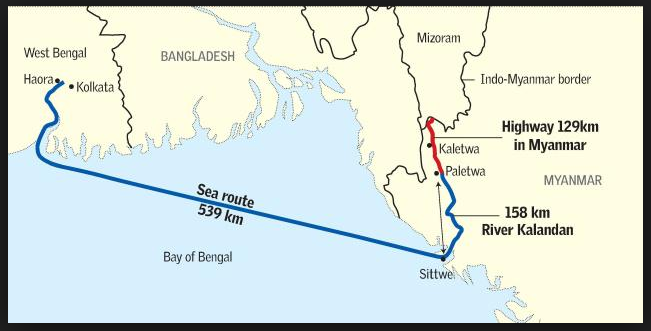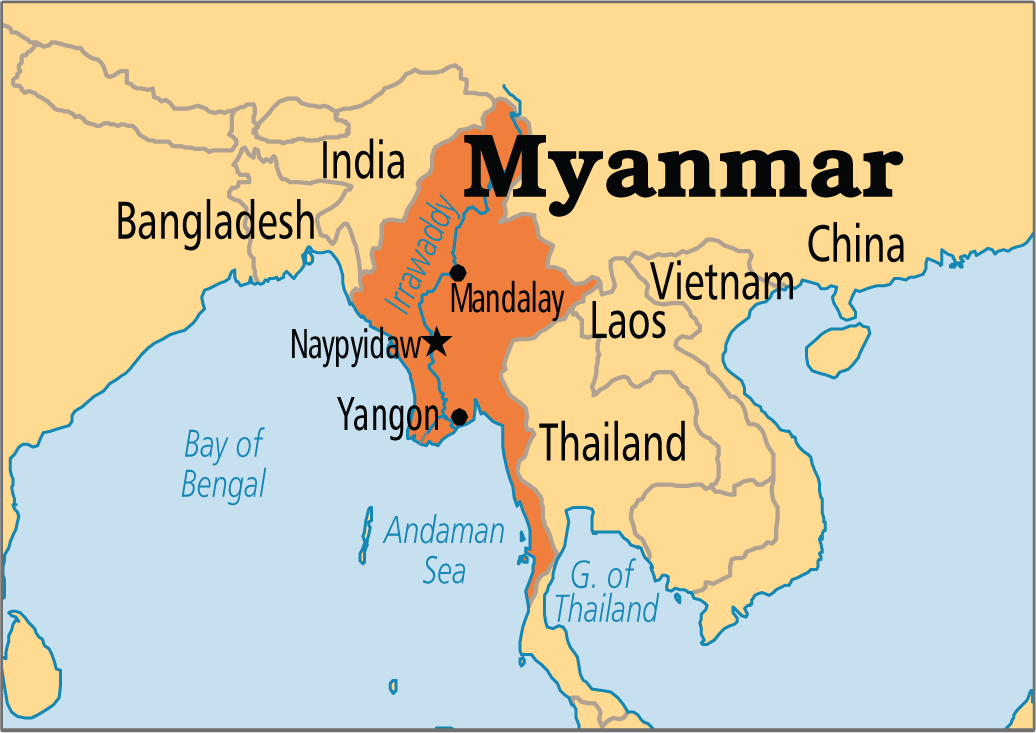International Relations
Military Coup in Myanmar
- 04 Feb 2021
- 8 min read
Why in News
Recently, the Myanmar military has grabbed power in a coup - the third time in the nation’s history since its independence from British rule in 1948.
- A one-year state of emergency has been imposed and democratically elected leader Aung San Suu Kyi has been detained.
- ‘Coup’ is generally described as a sudden, violent, and illegal seizure of power from a government.
Myanmar
- Location:
- Myanmar, also known as Burma, is in South East Asia and neighbours Thailand, Laos, Bangladesh, China and India.
- Demography:
- It has a population of about 54 million, most of whom are Burmese speakers, although other languages are also spoken. The biggest city is Yangon (Rangoon) but the capital is Nay Pyi Taw.
- Religion:
- The main religion is Buddhism. There are many ethnic groups in the country, including Rohingya Muslims.
- Polity:
- The country gained independence from Britain in 1948. It was ruled by the armed forces from 1962 until 2011, when a new government began ushering in a return to civilian rule.
- In the 2010s, the military regime decided to transition the country towards democracy. Although the armed forces remained powerful, political opponents were freed and elections were allowed to be held.
- The NLD won the 2015 election, the country’s first free and fair election participated by multiple parties, and formed the government, raising hopes that the country is on its way to full transition to democracy.
Key Points
- About the Military Coup:
- In the November 2020 parliamentary election, Suu Kyi’s party National League for Democracy (NLD) secured the majority of the seats.
- In the Myanmars’ Parliament, the military holds 25% of the total seats according to the 2008 military-drafted constitution and several key ministerial positions are also reserved for military appointees.
- When the newly elected Myanmar lawmakers were to hold the first session of Parliament in 2021, the military imposed a state of emergency for one year citing massive voting fraud in the parliamentary elections.
- Global Reaction:
- China: ‘All parties in Myanmar will properly handle their differences under the constitution and legal framework to maintain political and social stability’.
- USA: The USA President threatened to reimpose sanctions on Myanmar following a coup by the country’s military leaders and called for a concerted international response to press them to relinquish power.
- ASEAN Countries: ASEAN’s current chair, Brunei, called for ‘dialogue among parties, reconciliation and the return to normalcy’.
- Singapore, Malaysia and Indonesia expressed concern, while Thailand, Cambodia, and the Philippines noted that this was Myanmar’s ‘internal affair’.
- India’s Reaction:
- India supports the process of democratic transition in Myanmar.
- Though India has expressed deep concern over recent developments in Myanmar, cutting off from the Myanmar military is not a viable option as India has significant economic and strategic interests in Myanmar and its neighbourhood.
- India’s Strategic interests in Myanmar and its relations with Myanmar Military:
- India’s Relationship with Myanmar Military:
- India’s military-diplomatic outreach to Myanmar became a cornerstone of its Act East policy.
- On the eve of the recent visit of the Foreign Secretary Chief of the Army Staff to Myanmar in 2020, Myanmar handed over 22 Indian insurgents from across the border and it was decided to ramp up the sale of military hardware to Myanmar, including 105 mm light artillery guns, naval gunboats and more recently, lightweight torpedoes.
- Recent example of cooperation is that Myanmar has begun to vaccinate itself with the 1.5 million doses of Covid vaccine sent by India, while putting China’s 3,00,000 doses on hold.
- India’s Interests in Myanmar:
- Infrastructure and Connectivity: India has cultivated several infrastructure and development projects with Myanmar, which it sees as the “gateway to the East” and ASEAN countries:
- Operationalisation of the crucial Sittwe port in Myanmar’s Rakhine state by 2021 is committed.
- India assists infrastructure projects such as the India-Myanmar-Thailand trilateral highway and the Kaladan Multi-Modal Transit Transport Project.
- The Kaladan project will link Kolkata to Sittwe in Myanmar and then from Myanmar’s Kaladan river to India’s north-east.
- The two countries signed the Land Border Crossing Agreement in 2018, which allowed bona fide travellers with valid documents to cross the border at two international points of entry/exit- Moreh-Tamu and Zokhawthar-Rih.

- Infrastructure and Connectivity: India has cultivated several infrastructure and development projects with Myanmar, which it sees as the “gateway to the East” and ASEAN countries:
- Security: India has been concerned over some militant groups like the United National Liberation Front (UNLF) and National Democratic Front of Bodoland (NDFB) from the North-East region taking shelter in Myanmar.
- Indian needs perpetual support and coordination from Myanmar for the maintenance of security and stability along its North East border areas.
- Rohingya Issues: India is committed to ensuring safe, sustainable and speedy return of Rohingya refugees from refugee camps of India and Bangladesh.
- Building on the progress made under the Rakhine State Development Programme (RSDP), India has recently proposed to finalise projects under phase-III of the programme, including setting up of a skills training centre and upgrading of agricultural mechanisation.
- Investment: With Indian investments of over USD 1.2 billion, Myanmar holds considerable importance than any other country in South Asia.
- Energy: The two countries are also expanding partnership in the area of energy cooperation.
- Recently, India approved an investment of over USD 120 million in the Shwe Oil and Gas project.
- India’s Relationship with Myanmar Military:
Way Forward
India should continue to engage with the present regime in Myanmar working towards mutual development of people of both the countries while it should support sharing experiences in constitutionalism and federalism to assist Myanmar in resolving the prevailing stalemate.





